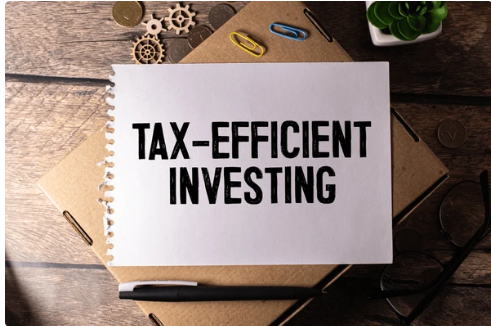TAX-EFFICIENT MUTUAL FUNDS INVESTING
Investing in mutual funds has become a popular choice for many Indian investors, offering diversification, professional management, and the potential for higher returns. However, when building wealth, it’s not just about the returns; tax efficiency is equally important. Choosing the right tax-efficient mutual funds can help you maximize your investment returns by minimizing the tax burden. In this blog, we’ll explore the key strategies and options for tax-efficient mutual fund investing in India. What are Tax-Efficient Mutual Funds? Tax-efficient mutual funds are schemes that offer the potential for tax savings while allowing your investment to grow. The Indian government provides various tax benefits to encourage investment in certain types of mutual funds, particularly under the Income Tax Act of 1961. By investing in these funds, you can potentially save taxes while benefiting from the growth of the equity and debt markets. 1. Equity-Linked Savings Scheme (ELSS) The ELSS is the most popular tax-saving mutual fund in India. ELSS funds primarily invest in equities (stocks) and offer tax deductions under Section 80C of the Income Tax Act, which allows you to claim a deduction of up to ₹1.5 lakh in a financial year. Key Features of ELSS: ELSS is ideal for investors with a moderate to high-risk tolerance, seeking both tax savings and capital appreciation over the long term. 2. Debt Mutual Funds with Indexation Benefits For investors with a lower risk appetite, debt mutual funds can be a tax-efficient option, especially when held for the long term. Debt mutual funds invest in bonds, government securities, and other fixed-income instruments. While the returns may not be as high as equity funds, they can offer stable income with tax advantages. Indexation Benefit: 3. Hybrid Funds for Tax Efficiency Hybrid mutual funds, which invest in both equities and debt, offer a balanced risk-reward profile and can also be tax-efficient. Some types of hybrid funds, like equity-oriented hybrid funds, are treated as equity for taxation purposes if their equity exposure is over 65%. This means that the LTCG from these funds (beyond ₹1 lakh) will be taxed at 10%, and short-term capital gains (STCG) at 15%. Taxation of Hybrid Funds: This flexibility makes hybrid funds suitable for investors seeking a mix of growth, income, and tax efficiency. 4. Systematic Investment Plans (SIPs) for Tax-Efficient Investing Systematic Investment Plans (SIPs) allow you to invest in mutual funds periodically (monthly, quarterly, etc.) rather than making a lump sum investment. From a tax-efficiency standpoint, SIPs in ELSS or equity mutual funds provide two key benefits: Rupee Cost Averaging: Tax-Efficient Returns: SIPs provide flexibility and discipline, making them a great way to build a tax-efficient portfolio over time. 5. Long-Term vs. Short-Term Capital Gains: Know the Difference Understanding the difference between short-term and long-term capital gains is crucial for tax-efficient investing in mutual funds. Equity Mutual Funds: Debt Mutual Funds: By holding mutual funds for the long term, you can benefit from favorable tax treatment, especially in the case of debt mutual funds. 6. Tax Harvesting Strategy Tax harvesting is an advanced strategy that helps reduce your tax liability by systematically booking long-term capital gains (LTCG) up to the ₹1 lakh exemption limit each financial year. By booking profits and reinvesting them, investors can ensure that they never pay taxes on LTCG from equity mutual funds. For example, if you have gains of ₹1.5 lakh in a financial year, you can sell enough units to book ₹1 lakh in gains (tax-free), and then reinvest the proceeds. This helps you reset the purchase price for tax purposes, allowing you to utilize the tax-free LTCG benefit each year. 7. Dividend Distribution Tax (DDT) and Growth Option In mutual funds, investors can choose between dividend and growth options. In the past, dividends received from mutual funds were subject to Dividend Distribution Tax (DDT). However, after the changes introduced in the 2020 Budget, dividends are now taxed in the hands of investors as per their income tax slab. Growth Option for Tax Efficiency: Conclusion Tax-efficient investing in mutual funds is not just about maximizing returns but also about minimizing the tax outgo. By selecting the right mix of tax-saving instruments like ELSS, taking advantage of long-term capital gains rules, using indexation benefits on debt funds, and employing strategies like tax harvesting, investors can significantly enhance their after-tax returns. Always align your mutual fund investments with your financial goals, risk tolerance, and time horizon, while also considering the tax implications. With the right approach, you can build a portfolio that not only grows your wealth but also does so in a tax-efficient manner. FREQUENTLY ASKED QUESTIONS (FAQs) 1. What is the lock-in period for ELSS mutual funds? 2. How does indexation benefit work in debt mutual funds? 3. Are mutual fund dividends still tax-free?
TAX-EFFICIENT MUTUAL FUNDS INVESTING Read More »











